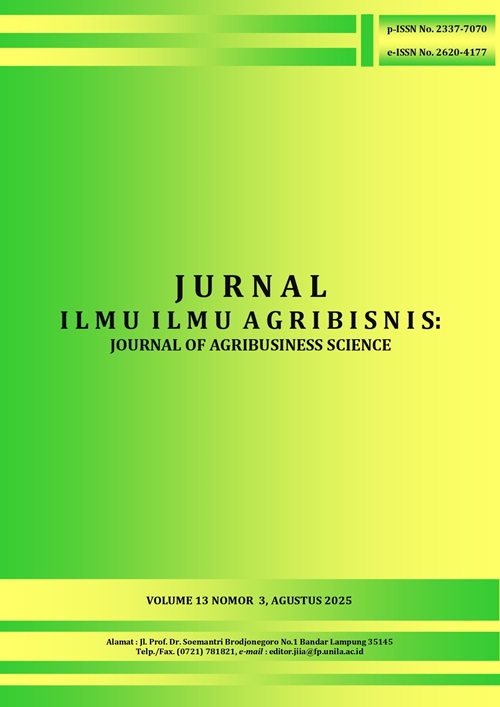KONDISI SOSIAL EKONOMI DAN TINGKAT KESEJAHTERAAN RUMAH TANGGA PETANI PADI DI KECAMATAN TRIMURJO KABUPATEN LAMPUNG TENGAH
DOI:
https://doi.org/10.23960/jiia.v13i3.10851 Abstract View: 98
Abstract View: 98
Abstract
This research aims to analyze the socio-economic conditions and the welfare level of paddy farmer households. The research location was purposely determined in Trimurjo Subdistrict, Central Lampung Regency. The research locations were determined using the Proportionate Stratified Random Sampling method, which divides the population into several categories based on land size. The number of samples in this study was 70 farmers taken from 2 villages, namely Tempuran Village with 47 people and Pujodadi Village with 23 people. The data analysis method for the socio-economic study was analyzed using descriptive quantitative methods. The welfare level was measured using the poverty line method of BPS (2024), World Bank (2023), and good service ratio (GSR). The results of the study indicate that the socio-economic conditions of paddy farmer households are dominated by farmers with an average age of 56 years, who have completed senior high school or its equivalent, and have side jobs as livestock breeders. Based on the BPS (2024) and the World Bank (2023) welfare level, farming households are classified as prosperous as their expenditure is above the minimum welfare threshold, which is IDR 3,024,817 per month or IDR 100,827 per day. However, according to the Good Service Ratio (GSR) method, the farmers are classified as less prosperous as the GSR value is greater than 1.
Key words: farmer households, socio-economic, welfare
Downloads
Downloads
Published
How to Cite
Issue
Section
License
Authors who publish with this journal agree to the following terms:
Authors retain copyright and grant the journal right of first publication with the work simultaneously licensed under a Creative Commons Attribution License that allows others to share the work with an acknowledgement of the work's authorship and initial publication in this journal.
Authors are able to enter into separate, additional contractual arrangements for the non-exclusive distribution of the journal's published version of the work (e.g., post it to an institutional repository or publish it in a book), with an acknowledgement of its initial publication in this journal.
Authors are permitted and encouraged to post their work online (e.g., in institutional repositories or on their website) prior to and during the submission process, as it can lead to productive exchanges, as well as earlier and greater citation of published work (See The Effect of Open Access).














